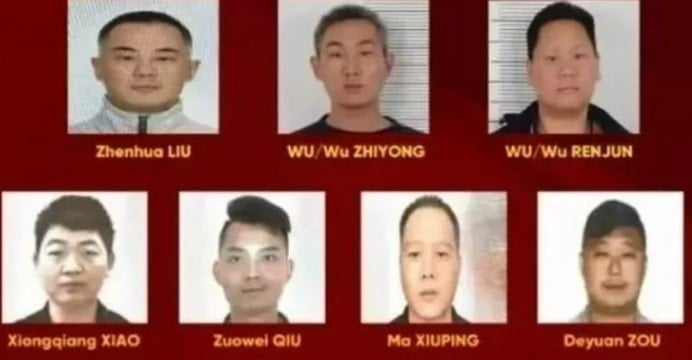Deadlier Than Mossad Spies: Inside the Chinese Spy Ring Caught in Turkiye

The Chinese spies outsmarted even the tactics of Israeli and Iranian agents.
In one of the most significant espionage operations uncovered in recent years, Turkish intelligence (MIT) succeeded in dismantling a spy ring working for China.
The spy ring had been infiltrating mobile phones and collecting data on Turkish government officials and members of the Muslim Uyghur minority, transmitting the information directly to Beijing.
On May 20, 2025, CNN Turk revealed what it described as a “hidden world” of fake devices, covert missions, and advanced surveillance technologies used by the Chinese state on Turkish soil.

Seven Spies
The case began when Turkish intelligence placed seven individuals, all recent arrivals from China, under surveillance after suspecting unusual activities.
They operated in several cities, including Istanbul, Izmir, Manisa, Balikesir, and Bursa, carrying what appeared to be ordinary devices. In reality, these were components of covert “ghost transmission stations” designed to evade detection.
Unlike traditional spying methods, these agents didn’t plant trackers on vehicles or monitor targets like private investigators or insurance firms. Instead, they deployed advanced equipment typically used by law enforcement—fake cell towers that trick mobile phones into connecting to them instead of official networks, allowing surveillance and data extraction to begin.
How Does a ‘Ghost Station’ Work?
Under normal conditions, a mobile phone connects to the nearest tower offering the strongest signal. The Chinese network exploited this mechanism by setting up fake transmission stations—known as ghost stations.
As soon as one of the spies came within 50 meters of a target, the fake station would lure the victim’s phone into connecting. From there, the system could begin duplicating everything—messages, calls, location signals, and even data from sensitive apps.
But one major question remained: how did such sensitive equipment used for these ghost stations make its way into Turkiye?
This was the focus of local media inquiries, and the answer came out during interrogations with the captured Chinese operatives.
The equipment had been smuggled into the country through a meticulously planned operation, worthy of veteran spies. Given the strict security monitoring, smuggling entire ghost stations through customs wasn’t an option.
Since the devices couldn’t pass through as regular consumer electronics, the spies devised a workaround: break the equipment into parts and bring them in gradually. Four “technical couriers” traveled on separate flights, each carrying specific components.
The first brought in the antenna, the second the battery, while the third and fourth carried other electronic pieces. Once inside Turkiye, the ghost stations were reassembled, far from the eyes of authorities.

‘More Sophisticated Than Mossad’
Commenting on the takedown of the Chinese spy ring, CNN Turk's news director Nihat Uludag said: “These weren’t amateurs or thrill-seekers—they operated with the precision of professional intelligence agencies.”
He even remarked that their methods “surpassed those of Mossad and Iranian operatives,” a claim supported by the investigation. When interrogated, the suspects initially claimed not to know each other—despite surveillance footage clearly showing them together.
In a dramatic twist, three members of the network were caught at the same location, yet insisted, “We don’t know each other.” But Turkish intelligence had already documented their every move in real time.
A joint investigation by the National Intelligence Organization (MIT) and the public prosecutor tracked their movements and identified each member's role—as couriers, operators, or handlers of the equipment.
One of them even offered a weak cover story, telling investigators: “I came to Turkiye to shoot a commercial.”
With the evidence complete, the network members were referred to court, where they face charges of espionage and transmitting classified data to a foreign state.
A senior intelligence official told Turkiye’s Sozcu newspaper that “this was one of the most complex operations we’ve conducted recently; it highlighted the scale of today’s security threats in an age of rapidly advancing technology.”
“The message here goes beyond Turkiye. Intelligence battles are no longer waged solely through traditional agents, but also via mobile devices, encrypted networks, and equipment that fits in a handbag and can be assembled in a residential neighborhood.”
“This won’t be the last Chinese spy ring to operate in Turkiye, but the way it was dismantled should serve as a blueprint for other countries: even the most advanced networks can collapse under precise intelligence work,” he added.
According to the paper, the leader of the cell, Zhenhua Liu, is a Chinese engineer who arrived in Turkiye five years ago to integrate, study the environment, learn the language, and establish a front company to support their activities.
Other network members include Wu Zhiyong, Wu Renjun, Xiongyang Xiao, Zuowei Qiu, Ma Xiuping, and Deyuan Zhu.

Previous Operations
The recently dismantled spy ring was not the first of its kind uncovered by Turkish intelligence. On February 19, 2024, another espionage cell directly linked to Chinese intelligence agencies was also taken down.
At that time, Turkish intelligence arrested six individuals in Istanbul on charges of conducting espionage activities targeting high-profile members of the Uyghur minority residing in Turkiye—on behalf of Beijing.
According to the state-run TRT network, a warrant was also issued for a seventh suspect, following an order from the Istanbul Public Prosecutor's Office.
The suspects were accused of systematically gathering sensitive information about Uyghur individuals and organizations and transmitting it to Chinese authorities in an effort to monitor the activities of the Muslim Uyghur community in Turkiye.
The exposure of that cell was seen as an early warning for Turkish security agencies, which subsequently intensified surveillance and tracking of individuals linked to foreign intelligence services—particularly those connected to China.
That increased vigilance paved the way for the takedown of the more recent network known in the media as the “Ghost Stations” cell, which deployed unprecedented surveillance technologies in the heart of Turkish cities.

Targeting the Uyghurs
Commenting on the growing Chinese espionage activity in Turkiye, Turkish journalist Ezgi Akin wrote that the dismantling of spy rings was not an isolated incident but part of a broader pattern of Chinese intelligence operations on Turkish soil—operations that specifically target the Uyghur community.
In a report published by al-Monitor on February 20, 2024, Akin noted that Turkiye hosts the largest Uyghur diaspora outside of China. The Uyghurs are a Muslim ethnic group of Turkic origin, primarily from the Xinjiang region.
Although Ankara-Beijing relations have generally improved, especially after President Recep Tayyip Erdogan’s re-election in May 2023, the issue of China’s treatment of Uyghurs remains a persistent point of tension.
The report traced several key moments in this strained dynamic, including Erdogan’s 2009 description of events in Xinjiang as a “genocide” and Turkiye’s 2019 stance at the UN Human Rights Council, where it urged China to respect Uyghurs’ religious freedoms. In response, Beijing temporarily closed its consulate in Izmir—a clear diplomatic signal.
Akin quoted Uyghur activist Abduresid Eminhaci, who lives in Turkiye, as saying there has been a sharp rise in Chinese espionage targeting the Uyghur population.
He estimated that nearly 70,000 Uyghurs residing in the country are now under direct surveillance by spy networks seeking to monitor their movements.
Eminhaci, secretary-general of the International Union of East Turkistan Organizations, an umbrella group representing roughly 20 Uyghur associations in Turkey, said members of the organization and others often have “strange” visitors asking “suspicious” questions or “offering money” in return for commercial information about Uyghur-owned businesses and companies that trade with them.
The United States and the European Union have accused China of repressing the Uyghurs and detaining tens of thousands of them in internment camps in a bid to strip them of their Islamic identity.
China denies the allegations, claiming the camps are designed to combat separatism and provide “re-education” to root out extremism.








